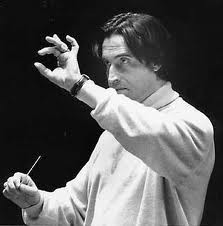Grosses Festspielhaus
Brahms – Piano Concerto no.2 in B-flat major,
op.83
Tchaikovsky – Symphony no.4 in F minor, op.36
Yefim Bronfman (piano)
Vienna Philharmonic Orchestra
Riccardo Muti (conductor)
It has never been entirely
clear to me why Brahms’s Second Piano Concerto seems to be performed less
frequently than his First – other, that is, than on account of the still more
extreme technical demands it places upon the pianist. Come to think about it,
we probably have our answer there, for it is surely the greater work of the
two, or at any rate the one falling more strongly within a tradition of
Mozartian perfection. I wonder, though, whether its less overtly tragic demeanour
has something to do with it. At any rate, in my experience at least, a
performance would appear to be a rarer occasion than one might expect. I
therefore greatly looked forward to this concert from Yefim Bronfman, the
Vienna Philharmonic, and Riccardo Muti.
It is very difficult quite to
put my finger on why I felt slightly nonplussed by the performance of the
Brahms. There was nothing wrong with it and a great deal to admire. Was I too
hung up on great recorded performances of old? Perhaps: I immediately think of
Gilels and Jochum here, and many readers will have their own favourites. The
horn solo opening was wondrously tender; as usual, the VPO gave of its best for
Muti. Bronfman’s response was musicianly, indeed that of a chamber musician.
Not that there were not more turbulent passages, but perhaps on balance, the
first movement was a little skewed towards the Apollonian. ‘Skewed’ is probably
the wrong word, though, for there was certainly some sense of a dialectic here.
And there was admirably big-boned pianism to relish too. Ultimately, though, I
felt this a movement observed rather than experienced. Perhaps the fault was
mine; stranger things have happened…
I was intrigued by the sense of
Mendelssohn in the shadows of the scherzo, both from the orchestra (Muti’s
doing, surely) and to a lesser extent the piano. Elfin rhythms were nicely
sprung, but there were darker colours and moods too. Muti imparted a fine sense
of grandeur to the trio, conflict in the cross-rhythms and all. The slow movement
I found just a little matter-of-fact. It was taken on the swift side, but better
that than dragging, and there was a greater sense of emotional involvement than
in the first movement. The solo cellist’s tone, however, was a bit of a
problem, especially earlier on: rather wiry, although certainly able to
project. Bronfman’s way with those magical, half-lit passages was special:
prophetic, certainly, of the late piano pieces. There was a degree of Haydnesque
playfulness to the finale, likewise a degree of Brahms in ‘Hungarian’ mode; I
wondered, though, whether a greater contrast between the two might have been
beneficial. At any rate, none of Brahms’s cruel demands held any obvious fear
for Bronfman.
I heard Muti conduct
Tchaikovsky’s Fourth Symphony with the Berlin Philharmonic in May. Memory can play tricks here, even when one
reads the earlier review. (I have not yet, although a link may be found above.)
However, I suspect that, admirable though that performance was, there was here
with the Vienna players a greater sense of urgency. The intimate scenes,
redolent of the contrast between public and private in, say, Eugene Onegin, were once again to be
heard and, more to the point, to be experienced. And the expressive range was
certainly greater than what, for whatever reason, we had heard in the Brahms. A
chamber ballet or a song without words? There was no need for Muti to choose in
the second movement; nor did he. I was put in mind of Berlioz at times, not
least in the way that the emotional complexities of the work were shown
potentially to be allied with complexities of genre and structure. The ghostly
dances of the scherzo were despatched, with precision, mystery, and fantasy,
leading to a finale of considerable nervous energy, rather as if the opening to
the final scene of an opera – which, in a sense, this almost is. Petersburg Onegin, perhaps? The argument was
symphonic, of course, but Muti and the VPO excelled also in summoning up an
aural stage before the eyes of one’s mind.






